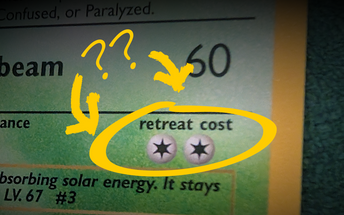Posted by Ross on Nov 25th 2025
What is the "retreat cost"?
Whether you're a seasoned veteran of the Pokémon video game series, a well-invested collector, or a newcomer to the Pokémon franchise, the term "retreat cost" may seem strange or unknown to you. Retreat Cost Pokemon Card Shop has been operating under this moniker since 2014, and in the years since the shop's humble beginnings, the term has remained a quizzical oddity to those yet to plunge into the depths of Pokémon TCG nerd-dom.
Pokémon.com defines retreat in the Pokémon Trading Card game as, "When you switch your Active Pokémon with one of your Benched Pokémon." While that may seem like a simple task, the detail that makes this game mechanic shine as a strategic powerhouse is the cost associated with retreating your active Pokémon. Present at the lower right-hand corner of each Pokémon card, retreat cost is shown with anywhere from 0–5 colorless energy symbols. These denote the number of energy cards that must be attached to the Pokémon before they're discarded in order to switch your active Pokémon with a benched one. When in normal circumstances it's only possible to attach one energy card from your hand to a Pokémon on your turn, it quickly becomes apparent how a higher retreat cost on your Pokémon could mean spending more than one or two turns attaching energy only to throw them into your discard pile.
When we break it down, there's far more to retreating and to the retreat cost in the Pokémon TCG than its simple definition. In practice, retreat in Pokémon TCG means moving your Pokémon around on the playing field from a more exposed, but offensive position, to the relatively protected, passive bench position. Retreat cost remains one of the core functioning mechanics that shape Pokémon TCG strategy, and if you pay attention you'll find dozens of cards that interact with raising cost, lowering cost, or completely inhibiting the retreat of yours or your opponent's Pokémon. From the simplest Item cards like 'Switch' and 'Escape Rope' to Tool cards like 'Float Stone' or 'Air Balloon', Stadium cards like 'Beach Court' and 'Galar Mine', and even Pokémon Abilities like Spidops ex's 'Trap Territory', there are endless means built into the game to interact with retreat cost, creating advantage for yourself or disadvantage for your opponent.
As a name, Retreat Cost shows in-the-know fans of the franchise from around the globe our knowledge and passion for the Pokémon Trading Card Game. We hope that the relative obscurity of the name sparks curiosity in those that haven't yet learned the significance of the term, thus fostering a deeper understanding about the hobby they've grown to love.

